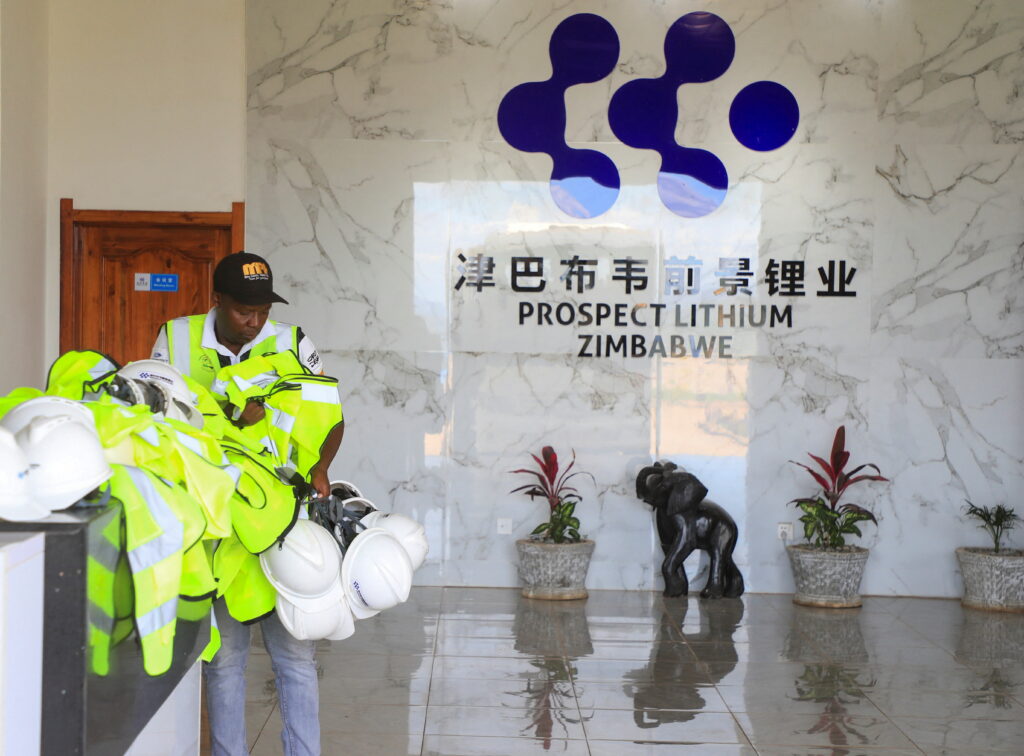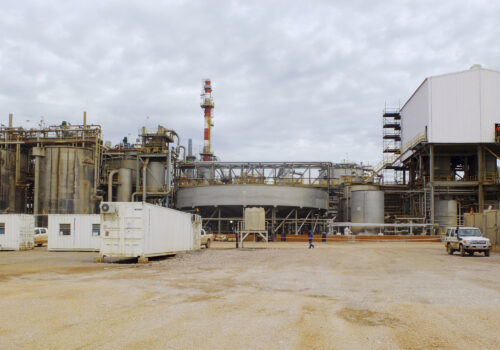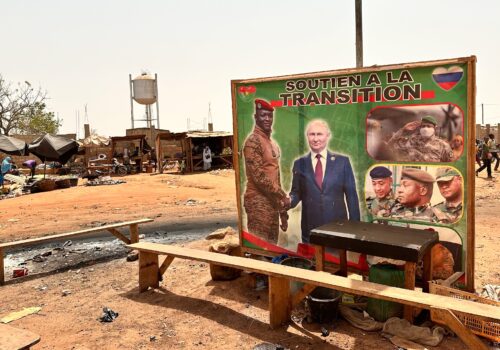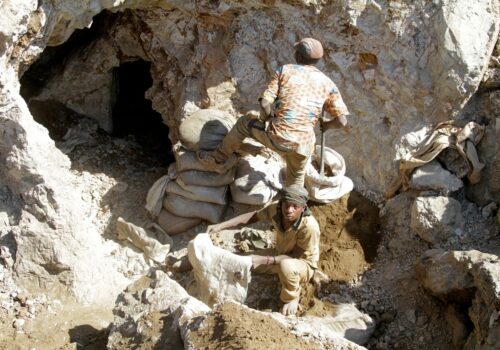There is a renewed international interest in Africa, specifically for the continent’s critical minerals, which are essential components of modern tools, from consumer electronics to defense technologies.
The global demand for critical minerals is only expected to increase in the coming years: The International Energy Agency predicts that by 2050, the demand for nickel will double, demand for cobalt will triple, and demand for lithium will rise tenfold as the shift toward low-carbon technologies (which use critical minerals) continues.
As the world sets its sights on Africa’s minerals, the competition for access is getting tougher, putting into question future access to these critical minerals. Multiple parties are actively laying claim to certain minerals and building supply chains to ensure their access—perhaps at the expense of the United States’ interests.
The power players
China is by far the largest player in the African mining sector, having secured advantageous supply chains for cobalt, graphite, magnesium, and other critical minerals. China has been closely involved in the extraction, refining, and production of these minerals for decades, as a result of efforts such as its massive Belt and Road Initiative. China currently controls 60 percent of global critical mineral production and 85 percent of processing capacity. Between 2003 and 2020, Chinese foreign direct investment in African minerals increased from $75 million to $4.2 billion. To date, China has established strategic partnerships with at least forty-four African countries. China has not, however, pursued multilateral alliances with other international partners, choosing instead to focus on renovating its state-owned enterprises.
Russia’s economic presence in Africa is not as vast as China’s, although Russian enterprises have engaged in projects that—while not massive in investment scale—carry significant strategic and political weight. Russian companies are aggressively increasing energy and mineral concessions in Africa, with significant stakes in ventures such as South Africa’s fourth-largest manganese miner, United Manganese of Kalahari. In Namibia, Russia’s Uranium One group secured eight uranium exploration licenses but has, in recent years, faced hurdles with securing permits that allow it to continue with uranium exploration.
Russia has also been expanding its influence across the continent through a state-funded military company called the Wagner Group (which the Russian Ministry of Defense reportedly recently took control of and lumped under a bigger group called the Africa Corps). In addition to expanding Russia’s influence, these mercenaries have secured lucrative mining deals. While those deals have primarily centered around gold, some experts are concerned about what such dealmaking means for the West’s access to critical minerals. These fighters capitalize on instability and supporting governments in times of conflict; in return, they benefit from increased access to natural resources and special diplomatic status. Russia, like China, has not positioned itself as a leader in major multilateral agreements, opting instead to maintain bilateral relationships with African nations that support its domestic industrial needs.
Whereas China made it a priority to corner the market for critical minerals two decades ago, the West (including the United States) was much later to the game and, therefore, has a comparatively weaker foothold in the sector. Western businesses have been hesitant to invest in African mining due to the many challenges associated with Africa’s natural-resource industries. Many countries rich in critical minerals struggle with weak governance, and this—combined with poor labor practices, environmental degradation, and the potential of fueling armed conflict—makes for a high-risk, unpredictable, and often unappealing investment environment. Despite these challenges, the potential rewards from securing a stable and diversified supply of these essential resources are growing, increasing international interest and investment in African mining.
The team players
While the gravity of Chinese and Russian activities around African minerals cannot be understated, the landscape of international involvement is much broader than these two giants. Several other countries are taking part in this strategic race. Notably, South Korea, Australia, Canada, and the United Kingdom are involved, not only in agreements with African countries but also in frameworks or partnerships with each other, sharing commitments that aim to enhance cooperation, ensure the use of sustainable and ethical mining practices, and secure stable supply chains for critical minerals. These countries are drawn to African minerals for their own national interests, and many also see the need to counterbalance Chinese and Russian efforts through the creation of partnerships with African countries and other partner countries interested in cooperation.
Canada is significantly involved in critical minerals in Africa, investing heavily in exploration and development projects, focusing on minerals such as cobalt, copper, and lithium. According to Canadian government data, the country has $37 billion worth of assets in African mining, with recent increases in assets in the Democratic Republic of Congo (DRC), Mali, South Africa, Tanzania, and Zambia.
Australia also has an extensive and growing presence, with over 145 Australian Securities Exchange-listed mining companies operating just under five hundred mines across thirty-four countries. Many current operations surround gold reserves in West Africa, but several companies are beginning to explore the continent’s graphite, manganese, and uranium reserves. Much of Australia’s recent focus has been on Tanzania, with Australian companies having claimed more than 90 percent of the new exploration licenses offered by the critical-mineral hotspot in the last two years. In addition to Australia’s significant economic presence in Africa, there has been a renewed emphasis on strengthening diplomatic ties. In December 2022, Australia’s assistant foreign minister visited Ghana, South Africa, and Morocco, marking the first visit by an Australian foreign affairs ministerial representative to the continent in six years.
The United Kingdom is similarly expanding its partnerships, with an eye on promoting responsible exploration, development, production, and processing of critical minerals. In November 2022, the United Kingdom and South Africa agreed to a working partnership on minerals for clean energy technologies, and they have also agreed to hold a regular ministerial dialogue on critical minerals. Eager to diversify its supply chain, the United Kingdom has recently turned to Zambia, a major producer of copper, cobalt, manganese, and nickel. The two nations entered into the Green Growth Compact, aimed at generating over $3.2 billion of British private-sector investment in Zambia’s mining, minerals, and renewable energy sectors, with an additional $650 million of government-backed investments. Beyond forming partnerships with African countries, the United Kingdom is also pursuing partnerships with other nations looking to invest in minerals and curb Chinese influence in Africa. In September 2023, the United Kingdom and Japan established a framework to jointly invest in African mine development and to stabilize their mineral supply chains. Diversifying sources of critical minerals is especially important for Japan, which has become increasingly dependent on China for its minerals for the production of electric vehicle batteries and clean energy.
South Korea has significantly ramped up its efforts to establish a robust presence in the mining sector, focusing on securing raw minerals essential for its electronic and automotive industries. In June 2024, the South Korean government held its first summit with Africa, which took place in Seoul and Ilsan. The summit—attended by more than thirty African heads of state—sought to directly develop stronger ties with countries that are increasingly seen as vital for South Korea’s production of semiconductors, solar panels, and electric vehicle batteries. The countries meeting at the summit launched a Korea-Africa Critical Minerals Dialogue, and South Korea committed to expanding official development assistance to African countries. South Korean companies pledged $57.9 million in various commitments, and forty-seven agreements and memorandums of understanding were cemented—including two on critical minerals cooperation with Madagascar and Tanzania. South Korea also pledged to donate ten billion dollars in foreign aid to Africa by 2030 and a further fourteen billion dollars in export credits to South Korean firms wanting to enter African markets. Lastly, while not directly focused on critical minerals, Seoul signed a $2.5 billion concessional loan agreement with Tanzania and solidified a similar billion-dollar deal with Ethiopia, both intended to fund significant health and infrastructure upgrades, signifying South Korea’s intensifying interest in working with African countries.
What sets these countries apart in the critical-mineral competition is that they are engaging simultaneously in international collaborative efforts. Recognizing that no single country can address these challenges alone, these countries have come together with others to form international initiatives and agreements to promote sustainable and ethical mining practices and secure stable supply chains.
In 2022, Australia, Canada, Finland, France, Germany, Japan, South Korea, Norway, Sweden, the United Kingdom, the United States, and the European Commission came together to form the Minerals Security Partnership to create diversified and responsible supply chains and catalyze public and private investment in critical minerals. Another agreement to come out of 2022 was the Sustainable Critical Minerals Alliance—established by Australia, Canada, France, Germany, Japan, the United Kingdom, and the United States—which promotes ethical, environmentally sustainable, and socially responsible sourcing of critical minerals.
These multilateral initiatives play a pivotal role in the global race for Africa’s critical minerals. They promote high standards in mining initiatives, enhance supply chain security, support international dialogue, and facilitate knowledge and resource sharing. By promoting investment diversification, high governance standards, and geopolitical alliances, these initiatives also offer African nations sustainable and equitable alternatives to the often-exploitative practices of China and Russia. They contribute to a more balanced and fair global competition for Africa’s critical minerals, ensuring that the benefits of these resources are more widely and fairly distributed to the people in the countries producing critical minerals.
The lone wolves
Other countries are pursuing critical minerals in Africa but are doing so more independently. India, the United Arab Emirates (UAE), and Saudi Arabia, in particular, are focusing on securing critical minerals through bilateral agreements and direct investments, often outside of broader international frameworks.
Saudi Arabia and the UAE have both expanded their presence in Africa’s critical-mineral industry, with the UAE leading the charge. The UAE has made significant investments in Africa’s mining sector as it seeks to diversify its economic portfolio and keep pace with the shift to low-carbon energy. Emirati foreign direct investment has been primarily directed toward copper-rich Zambia and the DRC. The UAE has also been deepening its economic ties with Angola since 2021, as Angola is thought to have sizeable unexplored reserves of critical and rare-earth minerals, such as copper, cobalt, manganese, and lithium, which are all essential to the UAE’s tech and renewable-energy ambitions.
According to the Arab Gulf States Institute in Washington, Saudi Arabia has been actively pursuing critical-mineral deals in Africa over the past year and has pledged to invest ten billion dollars in African mining projects over the next five years. Saudi Arabia ‘s interest in Africa’s critical minerals has increased in recent years, especially as it tries to meet the goals of its Vision 2030 economic diversification plan, although it hasn’t yet disclosed any direct and formal deals. In January, Saudi Arabia signed memorandums of understanding for mining investments with the DRC, Egypt, and Morocco. It has demonstrated interest in bauxite mining in Guinea as well.
India is also ramping up its engagement in the African mining sector through direct investments and partnerships with African countries. India is focused on securing essential minerals to support its rapidly growing manufacturing and technology sectors, aligning with its broader strategic goal to counterbalance the dominant position of China. India’s Ministry of Mines said that New Delhi was in discussions with the DRC, Côte d’Ivoire, Malawi, Madagascar, South Africa, Mali, Morocco, Tanzania, Mozambique, Zambia, and Zimbabwe to secure mining collaborations and access agreements. India currently has memorandums of understanding with six of those countries, through which it aims to secure supplies of cobalt, nickel, graphite, diamonds, platinum, and uranium.
The UAE, Saudi Arabia, and India, however, are not part of multilateral frameworks that promote collaborative, standardized, and sustainability-focused mining practices, such as the Minerals Security Partnership or the Sustainable Critical Minerals Alliance.
How the United States should navigate this race
Despite many significant challenges, establishing a secure and stable supply chain for critical minerals is crucial to the United States’ security interests and economic future, and Africa remains a necessary component of that strategy. The United States must capitalize on the growing international interest in Africa’s critical minerals and strengthen partnerships with other collaborating countries (such as through multilateral frameworks) that might help counterbalance China and Russia’s influence, secure access to minerals for the United States, and ensure that African countries can reap the benefits of their own mineral wealth.
It would be wise to strengthen multilateral frameworks such as the Minerals Security Partnership or the Sustainable Critical Minerals Alliance, as they provide an already-established mechanism for international cooperation and bring together diverse groups of countries committed to sustainable and ethical mining practices. The United States can do so by extending membership to other countries including mineral-rich African nations, which would enhance global cooperation, further promote shared sustainability and transparency standards, and help facilitate the transfer of necessary technical and financial support. This increased participation would not only regulate standards across borders but also create a more transparent and predictable investment environment. And the shared standards and accountability mechanisms established through these multilateral frameworks would make conditions more attractive for private-sector investors too, ultimately boosting financial support for critical-mineral projects that are both economically viable and socially responsible.
As the race for Africa’s critical minerals continues, the United States should rally its allies and partners around a common vision backed by democratic values.
Sarah Way is a graduate of the University of Colorado Boulder’s International Affairs Program with a specialization in Africa and the Middle East. Her research centers on the intersection of natural resources and development, with a specific focus on extractive minerals in Africa.
Further reading
Wed, Aug 14, 2024
Critical minerals investment must avoid the mistakes of the past in African mining
AfricaSource By Rama Yade, Sibi Nyaoga
By getting mining investment right, the United States can set a new precedent for its collaboration with African countries in other areas, such as health, security, and technology.
Wed, May 1, 2024
With Africa’s minerals in demand, Russia and the US each offer what the other can’t
AfricaSource By Alexander Tripp
African countries must choose wisely between the United States and Russia in their search for a partner on critical minerals.
Fri, Jul 12, 2024
Integrating artisanal mining into the formal economy would benefit African miners and economies alike
AfricaSource By
Many artisanal and small-scale miners work informally and face harsh conditions. Here's how the international community can help.
Image: A worker holds safety materials at Prospect Lithium Zimbabwe mine in Goromonzi, Zimbabwe, January 9, 2024. REUTERS/Philimon Bulawayo



